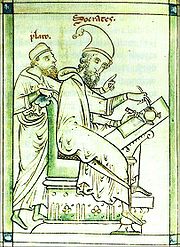
The Post Card: From Socrates to Freud and Beyond
Encyclopedia
The Post Card: From Socrates to Freud and Beyond is a 1980 book by French philosopher Jacques Derrida
. It is a "satire of epistolary literature." After Glas
(1974), it is sometimes considered Derrida's most "literary
" book, and continues the critical engagement with psychoanalysis
first signaled in "Freud and the Scene of Writing" (from the 1967 Writing and Difference).
 The first half of the book, titled Envois, contains a series of love letters addressed by Derrida to an unnamed loved one. In one of the letters, dated 6 June 1977, Derrida tells about his time spent in London with Jonathan Culler
The first half of the book, titled Envois, contains a series of love letters addressed by Derrida to an unnamed loved one. In one of the letters, dated 6 June 1977, Derrida tells about his time spent in London with Jonathan Culler
and Cynthia Chase, who had recently married. They showed Derrida an exposition of hundreds of card reproductions, among which was the medieval depiction of Socrates
taking dictation from Plato
, which seized Derrida's attention by its reversal of the historical relationship between the two figures (since Socrates himself left behind no written texts). After describing Plato's posture in the picture, and speculating about what he may have been doing Socrates's back (riding a skateboard, conducting a tram), Derrida says
"Envois" is followed by "To Speculate - On Freud", an extended commentary on Beyond the Pleasure Principle
; "Le Facteur de la Verité", a critique of Lacanian
psychoanalysis focusing on an analysis of Lacan's Edgar Allen Poe commentary, the "Seminar on 'The Purloined Letter'"; and "Du Tout", a response to questions posed by the psychoanalyst René Major concerning Glas
and Derrida's general relation to psychoanalytic theory.
Jacques Derrida
Jacques Derrida was a French philosopher, born in French Algeria. He developed the critical theory known as deconstruction and his work has been labeled as post-structuralism and associated with postmodern philosophy...
. It is a "satire of epistolary literature." After Glas
Glas (book)
Glas is a 1974 book by Jacques Derrida. It combines a reading of Hegel's philosophical works and of Jean Genet's autobiographical writing. "One of Derrida's more inscrutable books," its form and content invite a reflection on the nature of literary genre and of writing.-Columns:Following the...
(1974), it is sometimes considered Derrida's most "literary
Literature
Literature is the art of written works, and is not bound to published sources...
" book, and continues the critical engagement with psychoanalysis
Psychoanalysis
Psychoanalysis is a psychological theory developed in the late 19th and early 20th centuries by Austrian neurologist Sigmund Freud. Psychoanalysis has expanded, been criticized and developed in different directions, mostly by some of Freud's former students, such as Alfred Adler and Carl Gustav...
first signaled in "Freud and the Scene of Writing" (from the 1967 Writing and Difference).
Content

Jonathan Culler
Jonathan Culler is a class of 1966 Harvard graduate and Professor of English at Cornell University. He is an important figure of the structuralism movement of literary theory and criticism.- Background and career:...
and Cynthia Chase, who had recently married. They showed Derrida an exposition of hundreds of card reproductions, among which was the medieval depiction of Socrates
Socrates
Socrates was a classical Greek Athenian philosopher. Credited as one of the founders of Western philosophy, he is an enigmatic figure known chiefly through the accounts of later classical writers, especially the writings of his students Plato and Xenophon, and the plays of his contemporary ...
taking dictation from Plato
Plato
Plato , was a Classical Greek philosopher, mathematician, student of Socrates, writer of philosophical dialogues, and founder of the Academy in Athens, the first institution of higher learning in the Western world. Along with his mentor, Socrates, and his student, Aristotle, Plato helped to lay the...
, which seized Derrida's attention by its reversal of the historical relationship between the two figures (since Socrates himself left behind no written texts). After describing Plato's posture in the picture, and speculating about what he may have been doing Socrates's back (riding a skateboard, conducting a tram), Derrida says
"Envois" is followed by "To Speculate - On Freud", an extended commentary on Beyond the Pleasure Principle
Beyond the Pleasure Principle
"Beyond the Pleasure Principle" is an essay by Sigmund Freud. It marked a turning point and a major modification of his previous theoretical approach. Before this essay, Freud was understood to have placed the sexual instinct, Eros, or the libido, centre stage, in explaining the forces which drive...
; "Le Facteur de la Verité", a critique of Lacanian
Lacan
Lacan is surname of:* Jacques Lacan , French psychoanalyst and psychiatrist** The Seminars of Jacques Lacan** From Bakunin to Lacan: Anti-Authoritarianism and the Dislocation of Power, a book on political philosophy by Saul Newman** Lacan at the Scene* Judith Miller, née Lacan...
psychoanalysis focusing on an analysis of Lacan's Edgar Allen Poe commentary, the "Seminar on 'The Purloined Letter'"; and "Du Tout", a response to questions posed by the psychoanalyst René Major concerning Glas
Glas (book)
Glas is a 1974 book by Jacques Derrida. It combines a reading of Hegel's philosophical works and of Jean Genet's autobiographical writing. "One of Derrida's more inscrutable books," its form and content invite a reflection on the nature of literary genre and of writing.-Columns:Following the...
and Derrida's general relation to psychoanalytic theory.

